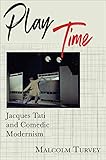Play Time : Jacques Tati and Comedic Modernism / Malcolm Turvey.
Material type: TextSeries: Film and Culture SeriesPublisher: New York, NY : Columbia University Press, [2019]Copyright date: ©2019Description: 1 online resource : 240 b&w photographs, 8-page color insertContent type:
TextSeries: Film and Culture SeriesPublisher: New York, NY : Columbia University Press, [2019]Copyright date: ©2019Description: 1 online resource : 240 b&w photographs, 8-page color insertContent type: - 9780231193023
- 9780231550116
- 791.4302/8092 23
- PN1998.3.T374 T87 2019
- PN1998.3.T374 T87 2020
- online - DeGruyter
- Issued also in print.
| Item type | Current library | Call number | URL | Status | Notes | Barcode | |
|---|---|---|---|---|---|---|---|
 eBook
eBook
|
Biblioteca "Angelicum" Pont. Univ. S.Tommaso d'Aquino Nuvola online | online - DeGruyter (Browse shelf(Opens below)) | Online access | Not for loan (Accesso limitato) | Accesso per gli utenti autorizzati / Access for authorized users | (dgr)9780231550116 |
Frontmatter -- CONTENTS -- Preface and Acknowledgments -- Introduction -- 1. Comedic Modernism -- 2. Comedy of Everyday Life -- 3. The Beholder's Share -- 4. Satirizing Modernity -- Afterword: Parade, Tati, and Participatory Culture -- Notes -- Bibliography -- Index
restricted access online access with authorization star
http://purl.org/coar/access_right/c_16ec
Jacques Tati is widely regarded as one of the greatest postwar European filmmakers. He made innovative and challenging comedies while achieving international box office success and attaining a devoted following. In Play Time, Malcolm Turvey examines Tati's unique comedic style and evaluates its significance for the history of film and modernism.Turvey argues that Tati captured elite and general audiences alike by combining a modernist aesthetic with slapstick routines, gag structures, and other established traditions of mainstream film comedy. Considering films such as Monsieur Hulot's Holiday (1953), Mon Oncle (1958), Play Time (1967), and Trafic (1971), Turvey shows how Tati drew on the rich legacy of comic silent film while modernizing its conventions in order to encourage his viewers to adopt a playful attitude toward the modern world. Turvey also analyzes Tati's sardonic view of the bourgeoisie and his complex and multifaceted satire of modern life. Tati's singular and enduring achievement, Turvey concludes, was to translate the democratic ideals of the postwar avant-garde into mainstream film comedy, crafting a genuinely popular modernism. Richly illustrated with images from the director's films, Play Time offers an illuminating and original understanding of Tati's work.
Issued also in print.
Mode of access: Internet via World Wide Web.
In English.
Description based on online resource; title from PDF title page (publisher's Web site, viewed 02. Mrz 2022)


